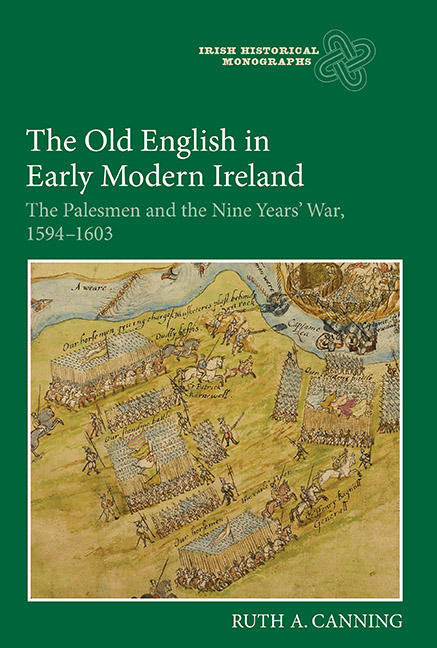Book contents
- Frontmatter
- Dedication
- Contents
- Acknowledgements
- Note on Conventions
- Abbreviations
- 1 Pale Politics: An Old English Community and the Outbreak of War
- 2 Instruments of Sedition: Priests and the Pale
- 3 Secret Traitors and Crown Colluders: The Palesmen's Response to Patriotic Pressures
- 4 ‘Patriot Games’: Old English Participation in the Crown's Military Enterprise
- 5 ‘Road to Perdition’: The Socio-Economic Impact of War on the Pale
- 6 Office and Influence: Defending a Tradition of Privilege
- Epilogue: An Inconclusive Aftermath
- Bibliography
- Index
- Irish Historical Monographs Previous Volumes
4 - ‘Patriot Games’: Old English Participation in the Crown's Military Enterprise
Published online by Cambridge University Press: 07 September 2019
- Frontmatter
- Dedication
- Contents
- Acknowledgements
- Note on Conventions
- Abbreviations
- 1 Pale Politics: An Old English Community and the Outbreak of War
- 2 Instruments of Sedition: Priests and the Pale
- 3 Secret Traitors and Crown Colluders: The Palesmen's Response to Patriotic Pressures
- 4 ‘Patriot Games’: Old English Participation in the Crown's Military Enterprise
- 5 ‘Road to Perdition’: The Socio-Economic Impact of War on the Pale
- 6 Office and Influence: Defending a Tradition of Privilege
- Epilogue: An Inconclusive Aftermath
- Bibliography
- Index
- Irish Historical Monographs Previous Volumes
Summary
Sixteenth-century English commentators constantly denigrated the dedication, dependability, and loyalty of Ireland's Old English Pale community. Yet contemporary records pertaining to the Nine Years’ War show that large numbers of Old Englishmen willingly served the crown against their Gaelic Irish Catholic countrymen. These records suggest that the military contribution of the Old English Pale community has been grossly underestimated and that the role of the Palesmen in the eventual victory of the English crown deserves more detailed examination. In order to do this, disparaging comments must be weighed against surviving testimonies of military performance. The rare laudatory commendations of certain servitors demand consideration as a means for exploring the achievements and careers of those involved. Condemnation is the overriding theme, but there are a number of records which praise extraordinary feats of martial service by specific Old English individuals and these offer important insight into the military participation of the wider community. A case in point is James Sedgrave, ‘a gentleman Cornett’ and ‘an Irish Meath-man of great size and courage’, who distinguished himself on the battlefield at Clontibret on 27 May 1595.
Clontibret was the first true test of arms during this conflict at which the Irish Confederacy inflicted an embarrassing ‘moral’ defeat on the queen's army. Though badly shaken and demoralised, that the crown army managed to escape total annihilation can be almost entirely attributed to the valiant actions of one man, James Sedgrave. The details of this battle have been recounted elsewhere and need only be summarised here. On 25 May 1597 Hugh O'Neill's nemesis, Marshal Henry Bagenal, marched out of Newry at the head of an impressive crown force, supposedly so large as to intimidate the enemy from showing its face. Their mission was to relieve the beleaguered Monaghan fort, which they achieved with relative ease. Having successfully supplied the garrison, the army began the return journey to Newry on 27 May, but by an alternate route. This time the marching column was ambushed in a terrain unconducive to its preferred methods of combat. By midday, the crown army, already handicapped by large numbers of raw recruits and a severe shortage of experienced military commanders, was running short on powder and faltering under a constant barrage of well-aimed musket volleys and cavalry charges by the Irish enemy. In effect, the great crown army was fighting a losing battle.
- Type
- Chapter
- Information
- The Old English in Early Modern IrelandThe Palesmen and the Nine Years’ War, 1594–1603, pp. 84 - 125Publisher: Boydell & BrewerPrint publication year: 2019



